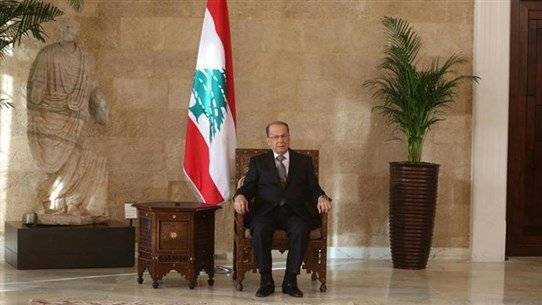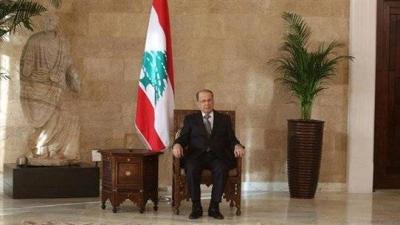As attention focused on the elections for the presidency of the Parliament and its deputy, discussions about the upcoming presidential election surfaced. It is important to note that the logical and constitutional order of these elections begins after the parliamentary elections, followed by the second presidency (Parliament), then the formation of a new government, and finally the first presidency and the election of a new president for the republic. However, while discussions oscillated between a comprehensive agreement or delaying one entitlement after another, the topic of the presidency emerged from two angles: first, words from the head of the "Free Patriotic Movement," Gebran Bassil, following the parliamentary elections, and second, the stance taken by MP General Jamil Sayyed from the presidential palace in Baabda.
The term of President Michel Aoun ends on October 31st. Article 73 of the Constitution stipulates that "at least one month and no more than two months before the end of the President's term, the parliamentary council shall convene at the invitation of its president to elect a new president. If the council is not summoned for this purpose, it shall automatically meet on the tenth day preceding the end of the president's term." This constitutional text means that the possibilities of electing a successor to Aoun will begin on September 1st, exactly three months prior. However, this constitutional scenario has not been adopted in Lebanon for a long time, specifically since the Taif Agreement.
Between the election of President René Moawad and his assassination, then the election of President Elias Hrawi and his extension, as well as the same for General Emile Lahoud, and then the presidential vacancy before electing President Michel Sleiman, and the vacancy again until Aoun's election, the political and constitutional realities have changed simultaneously.
For the second time, after refusing to leave the Baabda Palace as head of the transitional government in 1990, doubts arise about the possibility of Aoun repeating his earlier refusal to leave the palace at the end of his term. Aoun himself stirred a whirlwind of questions when he stated in a press interview that he would not hand over the presidency to a caretaker government; however, he later clarified that he would leave the Baabda Palace when his term ends, even if a caretaker government is in place.
General Jamil Sayyed's statement, following his meeting with the President days ago, opened the door to interpretations, especially as it came after Bassil’s position at the festival organized by the "Free Patriotic Movement" to celebrate its electoral results. Bassil alluded to three issues: firstly, stating, "If someone mistakenly thinks they can trade the presidency of the council for the vice presidency, they are wrong and undervaluing us"; secondly, calling to avoid a presidential vacuum by working on "our proposal for a constitutional amendment restricted to the electoral process, to be directly elected by the people in two rounds, one among the Christian constituents and a second for all Lebanese, to ensure proper representation and the strength of the position"; thirdly, and most notably, linking the governmental and presidential entitlements, saying, "(...) if there is stubbornness in forming a government, this confirms the intention not to form one and to bypass the constitution, considering the current government has complete powers," warning, "Beware, this nullifies the Taif Agreement and renders every constitutional position and institution without time limits."
Sayyed rejected the idea of the President handing over his powers to a caretaker government, while Baabda's circles responded critically to Sayyed's constitutional interpretations, affirming that Aoun will adhere to the constitution and leave Baabda on the night of October 31st, prompting Sayyed to respond again to them.
These conflicting signals from members of the same team tied to "Hezbollah" and its ally leave impressions about the nature of the upcoming phase, prioritizing the presidential file over others. Bassil was clear in hinting at errors in the calculations some have built their bets upon, referring to the bet on winning a numerically small bloc to sideline him from the presidential race. Notably, his competitor, the President of the "Lebanese Forces," Samir Geagea, secured almost an equal share with him, and Geagea notably recorded remarkable progress in the Christian street. As for the head of the "Maronite Free Patriotic Movement," Sleiman Franjieh, who only secured a seat for his son, Tony Franjieh, and will have allies like the Bayrut MP Waleem Touc and Kasrouan MP Farid Khazen, he has not removed himself from the presidential race. His meeting with Bassil in the presence of "Hezbollah" Secretary-General, Sayyed Hassan Nasrallah, before the elections, and his contribution to gathering votes for the "Free Patriotic Movement" in the northern third district, suggest he remains in the tight circles of "Hezbollah's" Christian allies vying for the presidency. He fulfilled his commitments to the party, as evident from Bassil’s public thanks to him.
However, gratitude has its limits concerning parliamentary elections. The presidential election is a different matter. Since it has been opened early, it will now serve as the key for the government and its formation and balances, owing to the current debate over the concept of a caretaker government and its potential substitution for the presidency. Article 62 of the Constitution states, "In the event of a vacancy in the presidency for any reason, the powers of the President shall be entrusted temporarily to the Council of Ministers." Some promoters of Aoun's non-departure from Baabda link his exit from the palace to the absence of a newly elected president, contingent upon the establishment of an effective government that enjoys the confidence of the parliamentary council, which contradicts with a caretaker government. On the other hand, recent experiences with caretaker governments have shown that prime ministers have been keen to adhere to the narrow concept of caretaking without exceeding it for any reason, even in sensitive conditions, as demonstrated by the resigned government of Prime Minister Hassan Diab. This means that failure to form a government before the end of Aoun's term will open the door to constitutional and political conflicts. It is worth noting that local and external political forces had previously backed the emergency formation of President Tamam Salam's government before the end of President Michel Sleiman's term to avoid similar constitutional issues. Current conditions, however, are different.
The one exiting Baabda is Aoun, not Sleiman, and the "successor," whom the President has repeatedly nominated, namely Bassil, will not stand idly by in the final months as the presidency slips from his hands. Therefore, the battle for victory in the elections has begun early, raising the question once again: Will the hint at Aoun's staying in Baabda become the theme of the new political bazaar, setting the stage for Bassil's early coronation? Or will it be the opposite, leading to renewed political wars amid the conflict between the opposition and the ruling faction and between the "Free Patriotic Movement" and the "Lebanese Forces," both of which hold equal shares from the elections? Will it function as a call for offers for a comprehensive settlement akin to the Doha Agreement?




